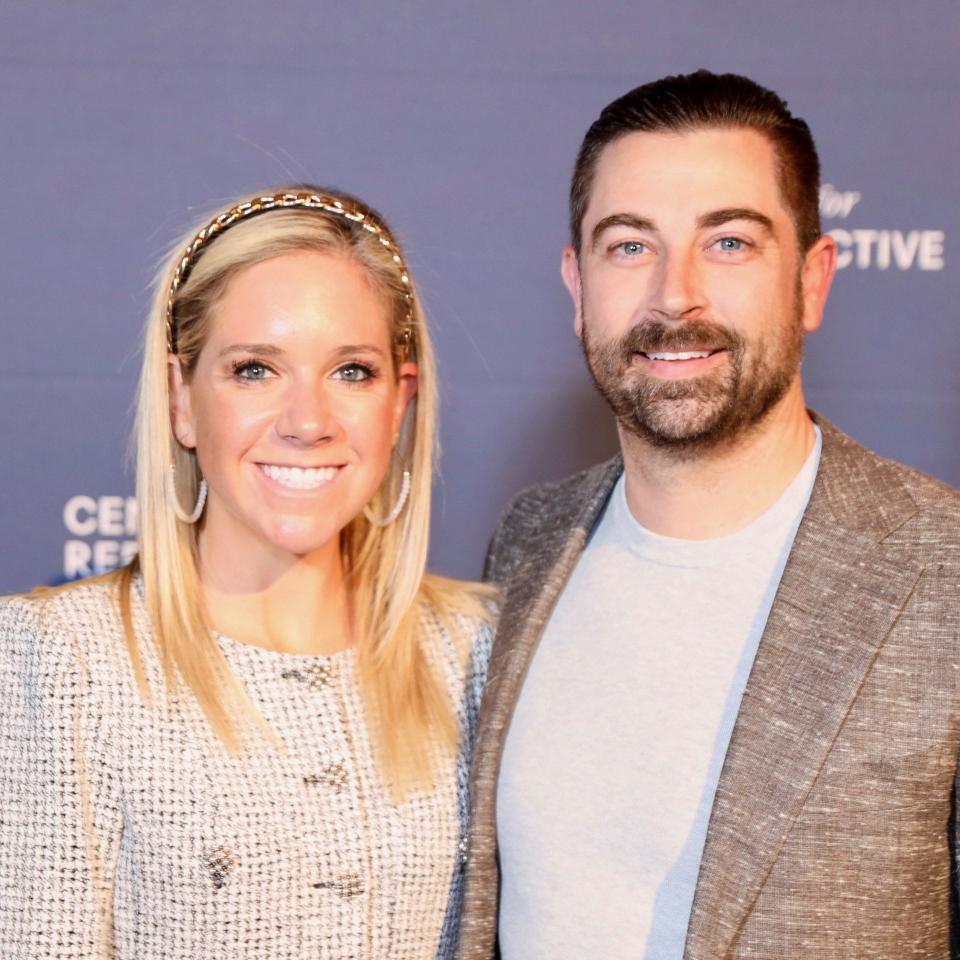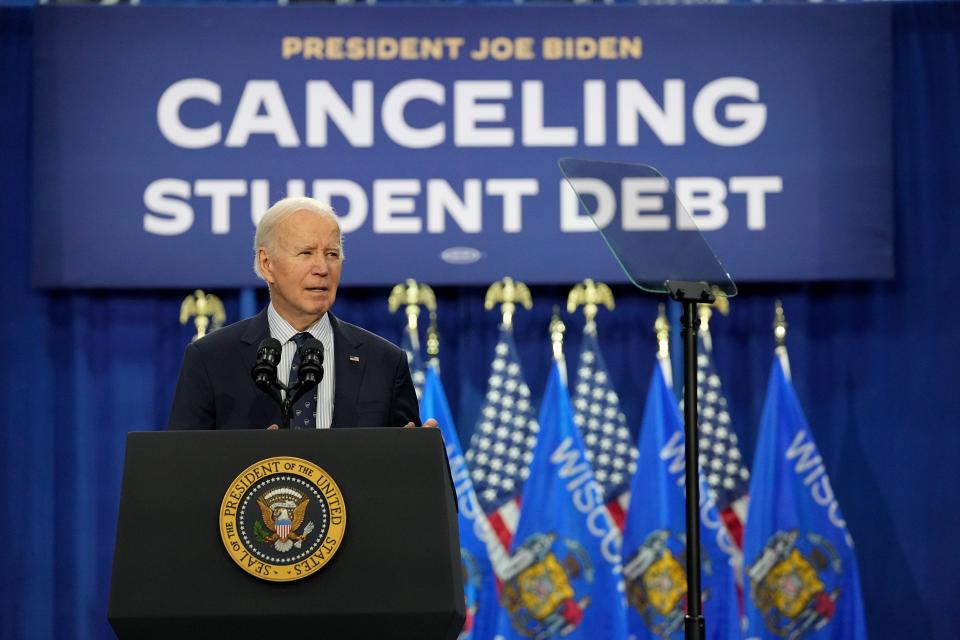Women who had life-changing experiences with abortion laws to campaign in Wisconsin for Biden
- Oops!Something went wrong.Please try again later.
The timing could not have been worse.
On Aug. 23, 2022, Amanda Zurawski learned her first pregnancy was in trouble. Only 18 weeks pregnant, her water broke. Her baby was coming too soon and, she was told by her doctor, was not going to survive.
A near total abortion ban had recently passed in their home state of Texas. Doctors no longer had the ability to quickly induce her, allowing her to deliver safely, before more problems occurred. Inducing her was considered an abortion.
Three days later, she developed a dangerous, potentially fatal infection known as sepsis from not receiving an induction after her water broke. The infection landed her in the intensive care unit and nearly killed her.
She survived, but scarring from the infection permanently closed one fallopian tube, compromising her ability to have children. For her safety, her doctor recommended she and her husband turn to in vitro fertilization or a surrogate to have a child.
Next week, she and Kaitlyn Joshua, who was turned away from two different emergency rooms in Louisiana while experiencing a miscarriage, will be in Wisconsin to campaign for President Joe Biden. Their visit is intended to highlight stark differences between the two leading presidential candidates' views on abortion.
“What we are trying to do with these events is really shed a light on what is happening across the country," Zurawski said. "First, we want to educate people on what is at stake in this election and then let people know that if Trump is reelected, this is going to be a national problem.”

Had Roe v. Wade, the federal law protecting the right to an abortion, not been overturned in June 2022 by the U.S. Supreme Court, Zurawski said her experience never would have happened. Had Roe v. Wade remained in place, the the Texas abortion law would not have changed. She tells her story in a new advertisement that recently began airing in Wisconsin.
“We were told first that we would lose the baby. That in and of itself was devastating," Zurawski told the Journal Sentinel on Thursday. "Compound that with the fact we were told we could not receive any sort of care because it would be considered an illegal abortion. I think I said to my husband a thousand times during those three days, 'I can’t believe this is happening.'"
The women will host a town hall meeting with Motherhood for Good, an organization of politically engaged progressive moms, on Monday in Milwaukee. A second Milwaukee event will be held Tuesday morning with Wisconsin Lt. Gov. Sara Rodriguez, doulas and reproductive rights advocates.
Zurawski and Joshua will then head to Madison for a discussion Tuesday afternoon and to Eau Claire on Wednesday. Locations and times for the events have yet to be released.
Donald Trump, Joe Biden have clear differences on abortion
Trump campaigned in 2016 with the promise to overturn Roe v. Wade and, once elected, nominated three conservative justices to the U.S. Supreme Court. The Trump campaign released an ad Monday in which Trump took credit for overturning Roe v. Wade and said it’s "now up to the states to do the right thing." Trump's statements on abortion have changed multiple times over the years.

Nevertheless, Rachel Lee, a spokeswoman with the Republican National Committee, said in a statement Thursday to the Journal Sentinel that Trump "could not have been more clear."
"These decisions should be left to the states to determine by vote or legislation or perhaps both," Lee said. "Dishonest Joe's position is also clear. He supports aborting an unborn child up until the moment of birth and even after birth − he also wants to make American taxpayers pay for it."
Zurawski said Trump's position tells her that he is endorsing all the limitations now being passed in individual states.
"His position tells me that what happened to me is OK. He endorses it. He agrees with it," Zurawski said.
Joshua, who lives in Louisiana, agrees. Following the overturning of Roe v. Wade, abortions were banned in Louisiana, with no exceptions for rape or incest.
In September 2022, Joshua was between 10 and 11 weeks pregnant. She started to suspect something was not right with her pregnancy. She went to two emergency rooms and was given little information as to what was happening, and was told to “monitor her symptoms.”

"How do I know how much blood is too much to lose?" she said. "I did a lot of Googling, a lot of research, which is wild for someone that has fully funded health care.
Joshua said she believes doctors were fearful to perform the necessary procedure — a dilation and curettage, or D&C — to end her pregnancy, as the procedure is also used to perform abortions.
"No one wanted to look me in the eye or have a conversation or even confirm on paper or verbally that I was having a miscarriage," Joshua said. "In that moment, I knew it was because of the abortion ban. It was a fear factor. They didn’t feel they could tell me what was happening with my body."

Leading up to the November election, Joshua and Zurawski are sharing their experiences in battleground states like North Carolina and Wisconsin. Zurawski said many women have shared similar stories with her.
Megan Kling of Taylor, a small town near Black River Falls, is one Wisconsin woman with such a story. She shared it with the Journal Sentinel earlier this year.
Kling learned when she was 22 weeks and 2 days pregnant that her third pregnancy was not viable. The fetus had bilateral renal agenesis. The condition has a 100% mortality rate and there is a 33% chance that the baby will die in utero.
Kling wanted to be induced and deliver her third child with her doctor in Black River Falls. That was and continues to not be an option in Wisconsin, where being induced past 20 weeks is considered an abortion — unless a women is close to, or past, her due date and the procedure is done for medical reasons.
Kling had to travel to the Mayo Clinic in Rochester, Minnesota, to end her pregnancy in the what she felt was the safest, most humane way possible.
Zurawski said more of these stories need to be told, allowing voters to know the ramifications of this election.
"I am driven by the fear that this will happen to other people if we don’t do something about it," Zurawski said. "I could not live with myself if I did not do something to help fix this problem."
Jessica Van Egeren is the Milwaukee Journal Sentinel's health care reporter. She can be reached at jvanegeren@gannett.com.
This article originally appeared on Milwaukee Journal Sentinel: Two women impacted by abortion laws to campaign in Wisconsin for Biden

